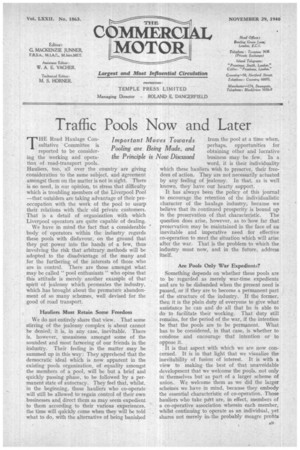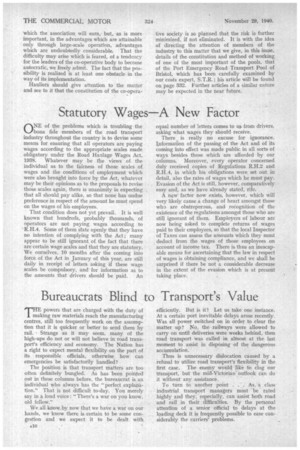Traffic Pools Now and Later
Page 11

Page 12

If you've noticed an error in this article please click here to report it so we can fix it.
THE Road Haulage Consultative Committee is reported to be considering the working and operation of road-transport pools. Hauliers, too, all over the country are giving consideration to the same subject, and agreement amongst them on the matter is not in sight. There is no need, in Our opinion, to stress that difficulty which is troubling members of the Liverpool Pool —that outsiders are taking advantage of their preoccupation with the work of the pool to usurp their relations with their old private customers. That is a detail of organization with which Liverpool operators are quite capable of dealing.
We have in mind the fact that a considerable body of operators within the industry regards these pools with disfavour, on the ground that they put power into the hands of a few, thus involving the risk that arbitrary methods will be adopted to the disadvantage of the many and for the furthering of the interests of those who are in control. There are those amongst what may be called "pool enthusiasts" who opine that this attitude is merely another example of that spirit of jealousy which permeates the industry, which has brought about the premature abandonment of so many schemes, well devised for the good of road transport.
Hauliers Must Retain Some Freedom We do not entirely share that view. That some stirring of the jealousy complex is about cannot be denied; it is, in any case, inevitable. There is, however, uneasiness amongst some of the soundest and most farseeing of our friends in the industry. Their feeling in the matter may be summed up in this way: They apprehend that the democratic ideal which is now apparent in the existing pools organization, of equality amongst the members of a pool, will be but a brief and quickly passing phase, to be follOwed by a permanent state of autocracy. They feel that, whilst, in the beginning, those hauliers who co-operate will still be allowed to-regain control of their own businesses and, direct them as may seem expedient to them according to their various experiences, the time will quickly come when they will be told what to do, with the alternative of being banished obtaining other and lucrative perhaps, opportunities for business may be few. In a from the pool at a time when, word, it is their individuality which these hauliers wish to preserve, their freedom of action. They are not necessarily actuated by any feeling of jealousy. In that, as is well known, they have our hearty support.
It has always been the policy of this journal to encourage the retention of the individualistic character of the haulage industry, because we believe that its continued prosperity is bound up in the preservation of that characteristic. The question does arise, however, as to 'how far that preservation may be maintained in the face of au inevitable and imperative need for effective co-operation to meet the situation which will arise after the war. That is the problem to which the industry must now, and in the future, address itself.
Are Pools Only War Expedienta?
Something depends on whether these pools are to be regarded as merely war-time expedients and are to be disbanded when the present need is passed, or if they are to become a permanent part of the structure of the industry. If the former, then it is the plain duty of everyone to give what assistance he can and do all that he is able to do to facilitate their working. That duty still remains, for the period of the war, if the intention he that the pools are to be permanent. What has to be considered, in that case, is whether to condone and encourage that intention or to oppose it.
It is that aspect with which we are now concerned. It is in that light that we visualize the inevitability of fusion of interest. It is with a view to making the best of that unavoidable development that we welcome the pools, not only in themselves but as part of a larger scheme of union. We welcome them as we did the larger schemes we have in mind, because they embody the essential characteristic of co-operation. Those hauliers who take part are, in effect, members of a co-operative association wherein each member, whilst continuing to operate as an individual, yet shares not merely in. the probably meagre profits which the association. will earn,but, as is more important, in the advantages which are attainable only through large-scale operation, advantages which are undoubtedly considerable. That the difficulty may arise which is feared, of a tendency for the leaders of the co-operative body to become autocratic, we freely admit. The fact that the possibility is realized is at least one obstacle in the way of its implementation.
Hauliers should give attention to the matter and see to it that the constitution of the co-opera live society is so planned that the risk is further minimized, if not eliminated. It is with the idea of directing the attention of members of the industry to this matter that we give, in this issue, details of the constitution and method of working of one of the most important of the pools, that of the Port Emergency Road Transport Pool of Bristol, which has been carefully examined by our costs expert, S.T.R.; his article will be found on page 332. Further articles of a similar nature may be expected in the near future.




















































